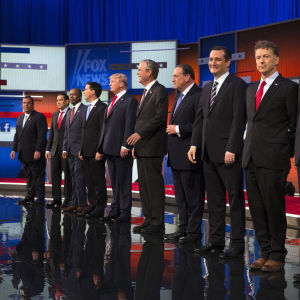It’s time to fix the presidential candidate debates. If they aren’t fixed, they’ll become as irrelevant as the president’s Saturday radio addresses. These don’t fall on deaf ears so much as they fall on no ears.
The debates, structured as they are at present, somewhere between “Jeopardy” and the National Spelling Bee, don’t cut it.
We all deserve to look at our best at times, and to be judged by our best opinions and ideas. But the present debate format shows every candidate at their worst; fumbling to recall names, tripping over facts half-remembered and looking, well, absolutely anything but presidential.
If the purpose of the debates is to gauge the worth of the candidates’ policies, the way we are doing it is hopeless, favoring (if these extended news conferences favor anyone) the candidate who can summon up the most loved political cliches. For the Democrats, protecting granny from being thrown under the bus; and for the Republicans, the de rigueur attack on the size of government.
None of it is enlightening; none of it answers the real questions of’ statesmanship or illustrates the mental agility and even cunning of the candidate — qualities that serve well in crisis.
The key to my debate fix is borrowed from the hugely popular Prime Minister’s Question Time in the British House of Commons.
Ever wondered how the prime minister can know the state of road repairs in Peebles in the Scottish Borders, and equally what the government is doing to protect British nurses in Bahrain? He isn’t the great Oz. He knows the question in advance, but not the follow-ups or the interjections. This leads to good answers (or at least plausible ones) and real repartee, as the two parties go at each other.
Now I can hear the howls, the shrieks, the hyena-like noises that will come from my colleagues in journalism, as they’re asked to commit the sin of submitting a question. But we’d get real answers. And those answers would lay the candidate open to penetrating follow-ups like these:
“What makes you think that the economy can grow, despite the best efforts of other presidents?”
“Are you proposing a return to the gold standard, and all the trouble with that?”
“How are you going to arrest 11 million people?”
“Are you going to survive stories of deportees being sent stateless out to sea?”
“Do you know that more illegal immigrants are coming here by plane than by foot across the Southern Border?”
“Why, to begin with, did you feel your e-mails should be exempt from the way of doing things observed by other secretaries of state — one rule for them and another for you?”
“If you want the government out of our lives, why do you want it in the most private of situations, when a woman is with her gynecologist?”
The follow-up questions would reveal who the candidates are far more than gotcha questions to people who cannot be prepared for every policy that a president might encounter in four years in office.
This formula would still allow for the spontaneous bon mots that every candidate hopes will lift him or her to verbal Valhalla, like Ronald Reagan’s near immortal “There you go again.”
After that first question, there would be cut-and-thrust, give-and-take, but solid positions would’ve been laid down, parameters established, such as how the candidate’s tax cut would be paid for, or why the Department of Defense, so at home with cost overruns, would do a better job with military and civilian nuclear wastes than the Department of Energy, a recurrent theme every election cycle.
If the candidates felt more comfortable on the major questions of their campaigns, they’d give better debate.

